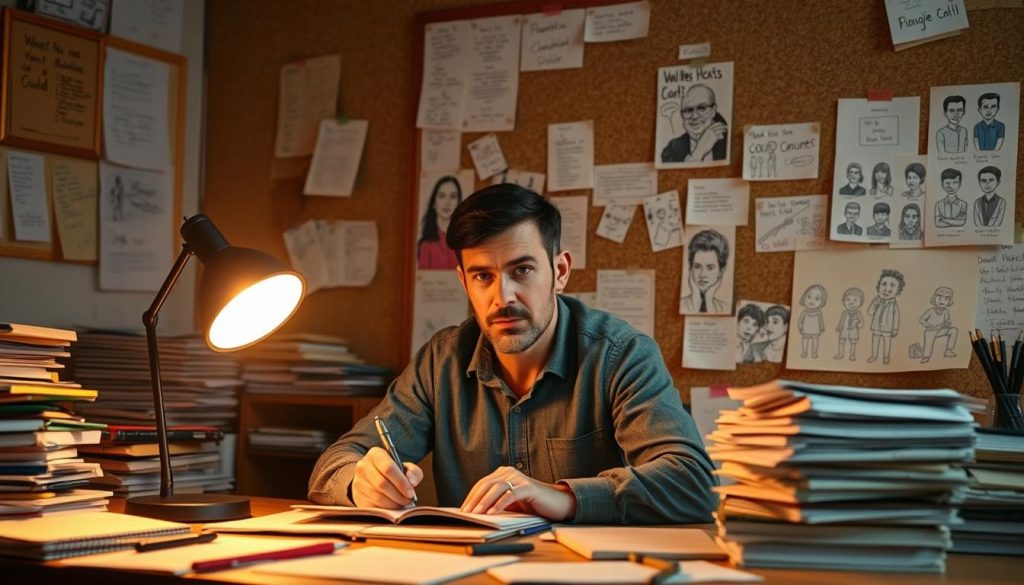Great stories begin with great writing. Whether you’re developing an indie film or a major television series, your project deserves professional screenplay development that brings your vision to life.
Our platform connects you with top-tier writing talent who specialize in transforming creative ideas into compelling visual narratives. These skilled professionals understand how to craft engaging content that captivates audiences.
The collaborative process ensures your unique voice shines through while maintaining industry standards. From initial concept to final polish, expert writers work closely with you to develop scripts that resonate.
Working with independent professionals offers flexibility and specialized expertise that in-house teams may lack. This approach allows for personalized attention to your project’s specific needs.
Table of Contents
Key Takeaways
- Professional scriptwriting transforms ideas into compelling visual stories
- Skilled writers develop screenplays that engage and captivate audiences
- Freelance professionals offer specialized expertise for various project types
- Collaborative writing process ensures your creative vision remains central
- Quality writing forms the foundation of successful film and television projects
- Independent writers provide flexible, personalized approach to screenplay development
What is Script Writing and Why It Matters
Every memorable film or television show starts with words on a page. Script writing transforms abstract ideas into concrete visual stories that can be produced and enjoyed by audiences worldwide.
This specialized form of creative writing serves as the blueprint for entire productions. Unlike other content writing forms, scripts provide detailed instructions for bringing stories to life.
The Art of Capturing Stories on Paper
Script writing represents the functional art of storytelling. It captures every aspect of a production in written form. From character development to visual descriptions, nothing gets left out.
Professional script writing follows specific industry standards. Proper formatting ensures everyone on set understands the vision. This structure helps directors, actors, and crew members work efficiently.
The creative process involves translating imagination into actionable instructions. Writers must balance artistic expression with practical production needs. This dual focus makes script writing uniquely challenging.
Bringing Creative Vision to Life
Quality writing forms the foundation of successful productions. Well-crafted scripts guide every subsequent phase of filmmaking. They ensure the final product matches the original creative vision.
Scripts detail numerous production elements:
- Story structure and narrative beats
- Character arcs and motivations
- Dialogue and conversational flow
- Visual landscape and scene descriptions
- Tone and emotional atmosphere
This comprehensive approach distinguishes script writing from other writing forms. It combines artistic creativity with technical precision. The result is a document that serves both creative and practical purposes.
Effective script writing requires both artistic sensibility and technical skill. Writers must understand visual storytelling while maintaining production feasibility. This balance ensures stories translate beautifully from page to screen.
The Comprehensive Role of a Professional Scriptwriter
Behind every great production stands a skilled writer who shapes the narrative foundation. These professionals handle multiple creative and technical responsibilities throughout the development process.

A professional writer builds worlds through words. They translate abstract ideas into structured stories that filmmakers can bring to life. This requires both creative vision and practical understanding of production needs.
« Writing is architecture, not interior decoration. »
The best writers understand how each element serves the larger story. They create cohesive narratives that maintain audience engagement from opening scene to final credits.
From Story Beats to Visual Landscape
Professional writers develop story beats that create natural rhythm and pacing. These structural elements guide the emotional journey of the audience.
Scene directions build visual landscapes without overwhelming readers. Descriptive yet concise language paints clear pictures for production teams.
Effective scripts balance visual description with narrative flow. The writer must provide enough detail while leaving room for directorial interpretation.
| Story Element | Writer’s Responsibility | Impact on Production |
|---|---|---|
| Story Beats | Create narrative structure | Guides pacing and emotional arc |
| Scene Directions | Establish visual environment | Informs set design and cinematography |
| Dialogue | Reveal character traits | Directs actor performance |
| Transitions | Maintain flow between scenes | Affects editing decisions |
Crafting Characters with Relatable Motivations
Character development begins with authentic personalities. Writers create individuals who feel real rather than plot devices.
Relatable motivations drive character actions throughout the story. These motivations create logical consistency in behavior and decisions.
Emotional connections form when audiences recognize shared human experiences. The writer’s experience with human psychology helps create these moments.
Professional writers maintain character consistency across the entire narrative. This ensures believable growth while preserving core personality traits.
Successful projects often feature characters who evolve naturally. Their journeys reflect the story’s themes while remaining personally meaningful.
Types of Projects Our Freelance Scriptwriters Handle
Professional storytelling adapts to countless visual formats and production needs. Our writers excel at creating compelling narratives across various media types and project scales.
These creative professionals understand how to tailor their approach for different audiences and platforms. They bring the same quality writing to short social media clips as they do to feature-length films.
Feature Films and Television Shows
Traditional entertainment formats require specific structural approaches. Feature films typically follow the classic three-act structure that guides audience emotional journeys.
Character development becomes particularly crucial in longer formats. Writers create multi-dimensional personalities that evolve throughout the narrative arc.
Television writing demands consistency across episodes while maintaining individual story integrity. Series writing balances ongoing character development with episode-specific plots.
Different genres require distinct tonal approaches. Dramas need emotional depth while comedies demand precise timing and wit.
Corporate Videos and Explainer Animations
Business communication benefits greatly from professional video scripts that convey complex ideas simply. These projects often serve marketing, training, or promotional purposes.
Explainer animations transform complicated concepts into accessible visual stories. The writing must balance educational value with engaging storytelling.
Corporate video content requires understanding brand voice and business objectives. Writers adapt their style to match organizational tone while maintaining audience engagement.
These projects often have specific conversion goals or learning outcomes. The writing serves both creative and functional purposes simultaneously.
Short Clips to Full-Length Productions
Modern content consumption includes everything from 15-second social media clips to full feature films. Writers adjust their approach based on runtime and platform requirements.
Short-form content demands immediate engagement and clear messaging. Every word carries significant weight in these condensed formats.
Web series and commercial spots require understanding platform-specific audience behavior. Writers create content optimized for how people consume media on different channels.
Longer formats allow for more gradual story development and character exploration. Writers pace narratives differently based on total runtime and episode structure.
Specialized formats like documentaries and interactive media require unique approaches. Documentary writing balances factual accuracy with narrative flow, while interactive scripts account for user choice pathways.
Budget considerations often influence writing approaches across different production scales. Writers understand how to maximize impact within various resource constraints while maintaining quality.
For comprehensive video production services that complement these writing capabilities, our partners offer complete creative solutions.
Why Choose a Freelance Scriptwriter for Your Project
Finding the right creative partner can transform your vision into reality. Independent writing professionals offer unique advantages that benefit projects of all sizes and types.

Working with external talent brings fresh perspectives to established concepts. These professionals operate outside organizational constraints, allowing for innovative approaches.
Flexible Storytelling for Various Mediums
Independent writers adapt their skills across multiple platforms. They understand different audience expectations and platform requirements.
This versatility ensures your story gets told effectively regardless of format. From web series to feature films, the approach remains consistently professional.
- Cost-effective solutions for projects with varying budgets
- Adaptable scheduling that matches production timelines
- Scalable involvement from consultation to full development
- Specialized genre expertise unavailable in generalist teams
The flexibility extends beyond mere availability. These professionals adjust their creative process to match your specific needs.
Expertise in Multiple Writing Styles
Seasoned professionals bring diverse experience from various projects. This exposure develops nuanced understanding of different narrative techniques.
They master everything from snappy commercial dialogue to epic character arcs. This range ensures appropriate tone and style for each unique project.
« The role of a writer is not to say what we all can say, but what we are unable to say. »
This creative writing approach combines technical skill with artistic expression. The balance produces work that resonates emotionally while meeting practical production needs.
Industry connections often accompany this professional experience. Many writers bring valuable networking opportunities that benefit your project’s overall success.
The right match depends on understanding your specific requirements. Targeted hiring ensures you get exactly the skills your project demands.
This approach proves particularly valuable for business projects with clear objectives. Professional writing elevates corporate content while maintaining brand voice and messaging.
Every job benefits from specialized attention. Independent professionals provide focused expertise that generalists might lack.
Our Scriptwriting Process: From Concept to Completion
Creating compelling screen content requires a structured approach that transforms ideas into actionable blueprints. Our proven methodology ensures every project receives the attention it deserves while maintaining creative integrity.
Initial Story Development and Plotting
The journey begins with brainstorming sessions that explore core concepts. Writers identify the central theme and emotional core of your narrative.
Plotting techniques establish the story’s backbone through detailed outlines. This structural foundation guides the entire writing process while allowing creative flexibility.
Professional writers develop beat sheets that map key moments. These documents ensure proper pacing and emotional progression throughout the script.
Dialogue Creation and Character Development
Character creation starts with deep personality profiling. Writers establish backstories, motivations, and unique voices for each individual.
Dialogue writing captures authentic speech patterns that reveal character traits. Conversations feel natural while advancing the narrative forward.
Personality traits emerge through actions and interactions. This approach creates multidimensional characters audiences connect with emotionally.
Research and Material Gathering
Thorough investigation forms the foundation of believable storytelling. Writers examine historical contexts, technical details, and cultural nuances.
Material gathering includes studying similar works and real-world references. This research ensures accuracy and authenticity in every scene.
Specialized subject matter receives particular attention. Experts consult relevant sources to maintain credibility throughout the narrative.
The writing process involves multiple collaborative stages:
- Initial concept development through creative brainstorming sessions
- Outline creation that establishes story structure and pacing
- Character backstory development and personality trait definition
- Dialogue writing that captures authentic voices and advances plot
- Research methodologies for historical or technical accuracy
- Multiple draft revisions with client feedback incorporation
- Final polishing before delivery for production readiness
This comprehensive approach ensures your project receives the detailed attention it deserves. The process balances creative freedom with structural discipline.
Collaboration remains central throughout development. Regular check-ins ensure your vision guides every decision while benefiting from professional expertise.
The final stage involves meticulous editing and refinement. This polishing process prepares scripts for seamless transition into production phases.
Quality Assurance: Editing and Polishing Services
The final stage of script development transforms good writing into production-ready excellence. This critical phase ensures every element works harmoniously before cameras start rolling.
Professional editing services catch issues that might otherwise derail production schedules. They maintain the creative vision while enhancing technical execution.

Thorough quality checks prevent costly mistakes during filming. They verify that every aspect meets industry standards and project requirements.
Ensuring Script Accuracy and Consistency
Consistency reviews maintain character authenticity throughout the narrative. Editors verify that personalities remain true to their established traits.
Timeline accuracy prevents chronological errors that confuse audiences. Scene transitions receive particular attention for smooth flow.
Fact-checking procedures validate technical, historical, or scientific content. This attention to detail builds credibility and avoids embarrassing inaccuracies.
Key consistency checks include:
- Character motivation and behavior patterns
- Plot point continuity and logical progression
- Timeline coherence across scenes and sequences
- Setting details and environmental consistency
- Tone maintenance throughout the narrative
Pre-Production Content Refinement
Dialogue polishing enhances natural flow while preserving character voices. Editors refine conversations to sound authentic yet purposeful.
Structural editing improves pacing and emotional impact. This process ensures the story maintains engagement from beginning to end.
Proofreading eliminates grammatical errors and formatting issues. These technical corrections maintain professional presentation standards.
The collaboration between writers and editors creates the best possible version. Multiple perspectives identify opportunities for improvement.
Final polishing prepares scripts for seamless transition into production. This last review catches any remaining issues before distribution.
Quality assurance represents smart business practice for any production company. It protects investments by preventing expensive reshoots and delays.
Client Success Stories and Industry Recognition
Our track record speaks through thousands of satisfied creators and producers. These relationships built on trust and excellence showcase our commitment to outstanding results.
4.84/5 Star Rating from 21,365 Reviews
From 21,365 reviews, clients rate our writing professionals 4.84 out of 5 stars. This overwhelming approval reflects consistent delivery beyond expectations.
Repeat business from satisfied clients demonstrates lasting quality service. Many partners return for multiple projects after experiencing successful collaborations.
« They transformed my vague concept into a production-ready masterpiece that attracted investors immediately. »
Transforming Ideas into Compelling Narratives
Our specialists turn ideas into compelling stories regardless of project scale. From indie shorts to major series, each narrative receives personalized attention.
Several projects developed through our platform achieved critical acclaim and festival recognition. These successes include award-winning screenplays and commercially distributed works.
One particularly challenging case involved adapting complex historical material into accessible drama. The resulting script secured funding and distribution before production began.
Industry partnerships with major studios and production houses validate our professional standards. These affiliations ensure our methods align with current market expectations.
Client testimonials consistently highlight seamless transformations from concept to completed production. This journey represents the core of our creative service experience.
The business of storytelling thrives on proven results and reliable partnerships. Our demonstrated success rate makes us the preferred choice for serious projects.
Finding the Perfect Freelance Scriptwriter Match
Selecting the right creative partner makes all the difference in your project’s success. The ideal match combines technical skill with collaborative chemistry.
Let’s find the perfect writer for you! This process involves careful evaluation of qualifications and creative compatibility.

Matching Skills with Project Requirements
Every project demands specific expertise. Evaluate qualifications based on your unique needs.
Genre specialization proves crucial for authentic storytelling. Horror requires different skills than romantic comedy.
Technical proficiency shows in formatting and structure. Look for writers who understand production constraints.
Experience with specific formats matters greatly. Feature film writing differs from web series development.
Reviewing Portfolios and Previous Work
Writing samples reveal style and voice consistency. Assess how writers handle different narrative challenges.
Portfolio diversity indicates adaptability. Look for range across genres and formats.
Client feedback provides insight into reliability. References confirm professional conduct and meeting deadlines.
Trial projects help assess collaborative fit. Small test assignments reveal communication styles.
Platform matching algorithms simplify your search. These systems analyze thousands of data points.
Consultant assistance guides your selection process. Experts help interpret writing samples and credentials.
| Evaluation Criteria | What to Look For | Why It Matters |
|---|---|---|
| Writing Samples | Consistent voice and technical accuracy | Ensures production-ready quality |
| Genre Experience | Previous work in similar styles | Guarantees authentic storytelling |
| Client References | Positive feedback and repeat business | Indicates reliability and satisfaction |
| Communication Style | Clear, responsive interaction | Ensures smooth collaboration |
| Technical Proficiency | Proper formatting and structure | Prevents production delays |
Interview processes reveal working styles. Discuss your vision and gauge their understanding.
Effective communication ensures shared goals. The right partner amplifies your creative vision.
For comprehensive guidance on evaluating professional qualifications, our partners offer detailed resources.
Previous work examination provides concrete evidence of capability. Study how writers handle projects similar to yours.
Platform Benefits: Working Through Professional Networks
Professional networks transform how creative professionals connect with meaningful projects. Unlike random marketplaces, specialized platforms create intentional matches that benefit everyone involved.
These networks understand that great collaborations grow from shared values and compatible working styles. The right platform becomes a partnership ecosystem rather than just a transaction space.
Building Long-Term Client Relationships
Quality platforms focus on lasting connections rather than one-off assignments. They create environments where professionals can develop ongoing partnerships with clients who appreciate their unique strengths.
This approach benefits both creative professionals and project owners. Consistent collaborations lead to better understanding and smoother workflows.
Relationship features include:
- Preference matching based on work style and project type
- Communication tools that maintain connection between projects
- Feedback systems that help partnerships grow stronger over time
- Performance tracking that identifies most compatible matches
These features create environments where professionals work with clients they genuinely enjoy. This satisfaction shows in the quality of the final product.
Access to Account Management Support
Dedicated management professionals help navigate project opportunities. They understand both creative needs and practical project requirements.
Account managers serve as strategic partners in career development. They identify projects that challenge skills while matching professional goals.
« The best creative partnerships feel less like business arrangements and more like shared journeys toward something meaningful. »
Support services include project matching, conflict resolution, and quality assurance. This comprehensive approach ensures smooth collaborations from start to finish.
Financial protections create security for all parties. Escrow services and clear payment terms prevent misunderstandings about compensation.
Communication tools keep projects organized and transparent. Shared workspaces, messaging systems, and file sharing maintain clear documentation.
Community features allow networking and skill development. Professionals connect with peers while expanding their capabilities through shared learning.
These managed environments reduce administrative burdens so creative professionals can focus on their craft. The platform handles logistics while talent concentrates on quality work.
For those looking to enhance their collaboration strategies, our partners offer comprehensive guidance on optimizing management approaches for creative projects.
Budget Considerations and Project Pricing
Smart financial planning ensures your creative vision gets the quality writing it deserves without breaking your production budget. Understanding different pricing approaches helps you make informed decisions that balance cost with creative excellence.
Every production has unique financial parameters. The right pricing model depends on your specific needs and timeline. Let’s explore the options available for your creative projects.
Understanding Hourly vs Fixed Rate Projects
Hourly rates work well for open-ended creative exploration. They provide flexibility when the scope might evolve during development.
Fixed pricing offers budget certainty for well-defined projects. This approach works best when requirements are clear from the start.
Our platform data shows various rate ranges:
- Under $15/hour: 45 professionals
- $15 to $35/hour: 109 professionals
- $35 to $60/hour: 52 professionals
- Over $60/hour: 24 professionals
Experience level significantly impacts rates. Seasoned writers command higher fees due to their proven track record.
Project complexity affects both pricing models. Research-intensive work requires more time and expertise.
Value-Based Investment in Quality Writing
Exceptional writing delivers returns far beyond its initial cost. Quality scripts attract better talent and funding opportunities.
Value pricing focuses on outcomes rather than hours spent. This approach aligns writer compensation with project success.
« Price is what you pay. Value is what you get. »
Revision policies should be clear from the beginning. Most professionals include one or two rounds of edits in their base pricing.
Payment schedules often use milestone-based structures. This approach protects both clients and writers throughout the creative process.
For detailed guidance on pricing strategies, explore our comprehensive freelance project pricing guide.
Smart budgeting considers the writing’s impact on overall production costs. Quality work saves time and money during filming and editing.
Your writing investment should reflect its importance to your project’s success. This business decision affects every aspect of your production.
Different project types require different budgeting approaches. Feature films demand more resources than short corporate videos.
The right pricing strategy ensures everyone feels fairly compensated. This creates positive working relationships that benefit your creative vision.
Industry Expertise and Specialized Knowledge
Professional writers bring more than just writing talent to your projects. They possess deep understanding of how stories work within specific production environments.
This specialized knowledge comes from years of experience and continuous learning. It separates competent writers from truly exceptional ones.
Film and Television Industry Insights
Understanding production workflows helps writers create practical scripts. They know what works on set and what causes delays.
Industry professionals stay updated on current trends and audience preferences. This awareness ensures stories resonate with contemporary viewers.
Budget awareness influences creative decisions throughout the writing process. Writers balance artistic vision with financial realities.
Networking within the industry provides valuable insights. These connections help writers understand what producers and directors seek.
Technical Writing vs Creative Writing Skills
Scriptwriting demands both technical precision and creative flair. The balance between these skills defines professional quality.
Technical writing ensures proper formatting and industry standards. Creative writing brings emotional depth and engaging narratives.
Professional development includes mastering both skill sets simultaneously. Writers continuously refine their approach to both aspects.
| Skill Type | Application in Scriptwriting | Industry Importance |
|---|---|---|
| Technical Writing | Proper formatting and structure | Ensures production feasibility |
| Creative Writing | Character development and storytelling | Creates emotional engagement |
| Research Skills | Authentic representation of subjects | Builds credibility and accuracy |
| Industry Knowledge | Understanding production limitations | Prevents costly revisions |
| Genre Expertise | Specific storytelling conventions | Meets audience expectations |
Genre specialization requires understanding specific conventions and audience expectations. Different genres demand unique approaches to storytelling.
Research methodologies ensure authentic representation of specialized subjects. Writers investigate thoroughly to maintain credibility.
Continuing education keeps professionals current with evolving techniques. They adapt to new technologies and storytelling methods.
Understanding production possibilities and limitations guides creative decisions. This practical knowledge enhances script viability.
The combination of industry knowledge and writing skills creates exceptional results. This expertise transforms good ideas into production-ready masterpieces.
Getting Started with Your Script Project
Launching your creative journey requires thoughtful preparation and clear communication. The initial phase sets the tone for your entire collaboration and ensures everyone understands the vision.
Successful projects begin with mutual understanding and shared excitement. Taking time to establish solid foundations pays dividends throughout the development process.
How to Initiate Your Scriptwriting Project
Begin by preparing a detailed project brief that outlines your objectives. Include your core concept, target audience, and desired outcomes.
Share reference materials that illustrate your preferred style and tone. Examples of similar works help align creative expectations.
Establish clear timelines with realistic milestones. This structure keeps the work progressing smoothly while allowing creative flexibility.
Key elements to include in your project brief:
- Central concept and thematic elements
- Character descriptions and relationships
- Desired format and approximate length
- Target audience and platform considerations
- Reference materials and inspirational examples
- Budget parameters and payment schedule
Contract essentials protect both parties and clarify expectations. Address intellectual property rights, revision limits, and confidentiality needs.
File management systems ensure version control throughout the process. Cloud storage with shared access prevents confusion over document iterations.
Communication Best Practices
Regular check-ins maintain momentum while allowing for course corrections. Scheduled updates prevent surprises and keep everyone aligned.
Constructive feedback focuses on specific elements rather than general criticism. Explain what works well alongside suggestions for improvement.
Positive reinforcement encourages creative risk-taking while maintaining quality standards. Celebrate progress and acknowledge strong work.
« Clear communication builds trust and transforms good ideas into great results. »
Response protocols set expectations for turnaround times. Establish preferred communication channels and availability windows.
Relationship-building gestures show appreciation for the collaborative effort. A simple thank-you message or positive feedback request strengthens partnerships.
Long-term relationships often begin with small thoughtful actions. These connections frequently lead to repeat collaborations and referral opportunities.
Document all agreements and changes in writing. This practice prevents misunderstandings and provides reference points if questions arise later.
Final delivery should include all associated materials and usage rights. Proper closure ensures smooth transition to production phases.
Conclusion
Your creative vision deserves professional execution. Quality writing transforms ideas into compelling narratives that captivate audiences.
Our process ensures your story gets told with passion and purpose. From initial concept to final polish, we match you with the perfect creative partner.
Take the next step in your project development. Connect with talented professionals who understand your unique needs.
Discover exciting opportunities through our freelance project platform. Transform your ideas into production-ready scripts today!
FAQ
What types of projects can a professional scriptwriter help with?
Our team handles everything from feature films and television shows to corporate videos, explainer animations, and short clips. Whether you need a full-length production or a brief video, we bring stories to life across various mediums.
How do you ensure the quality of the writing?
We focus on thorough editing and polishing to maintain accuracy and consistency. Our process includes multiple rounds of review, ensuring every script is refined and ready for pre-production.
What is the typical process for working on a script?
We start with initial story development and plotting, then move into dialogue creation and character building. Research and material gathering are key steps to make sure every detail supports the narrative.
How do I find the right writer for my project?
We match skills with your specific needs by reviewing portfolios and previous work. This helps ensure you get a writer whose style and experience align perfectly with your vision.
What are the pricing options for scriptwriting services?
A> Projects can be priced hourly or at a fixed rate, depending on your preference. We believe in value-based investment, so you get quality writing that fits your budget.
What kind of industry knowledge do your writers have?
Our team brings deep insights into film, television, and various writing styles. They balance creative storytelling with technical precision to meet industry standards.
How do I get started with a script project?
Simply reach out to discuss your idea! We’ll guide you through initiation and set clear communication practices to keep the project on track from day one.





